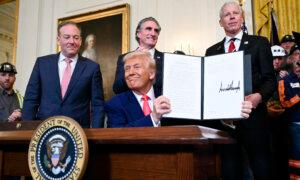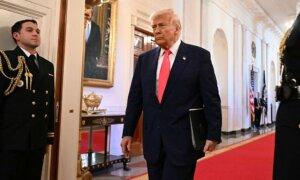The president’s actions also target Biden-era limits on gas stoves, water heaters, washing machines, furnaces, and dishwashers.
President Donald Trump signed four executive actions on April 9 aimed at deregulating a variety of industries, including energy and kitchen and bathroom appliances.
Trump criticized high-efficiency water faucets, suggesting they use the same amount of water as the products they intended to replace.
“It’s ridiculous. And what you do is you end up washing your hands five times longer, so it’s the same [amount of] water,” Trump said. “We’re going to open it up so that people can … get all of these things, including straws.”
The president referred to a previous executive order that rescinded a Biden-era order calling for the end of plastic straws in federal agencies and said he would get Congress to memorialize that and his actions on Wednesday “because most of it’s common sense.”
The Trump administration will return to the definition found in the 1992 energy law, which set a 2.5-gallons-per-minute standard for showers. Trump’s order accuses past regulatory moves of making showerheads “weak and worthless.”
Previously, showerheads were redefined as “nozzles,” and multi-nozzle showers became illegal if they collectively discharged more than 2.5 gallons of water per minute, the White House said.
Trump’s order also targets Biden-era rules on gas stoves, water heaters, washing machines, furnaces, and dishwashers.
“Agencies will extend only those regulations that affirmatively serve American interests. The rest will expire, resetting the regulatory landscape,” the order’s White House fact sheet states.
Other Regulations Targeted
A different Wednesday executive order was aimed at clawing back “anti-competitive” regulations. It directs all agency heads to coordinate with the attorney general and Federal Trade Commission (FTC) chairman to review all department regulations and identify any that “impose anti-competitive restraints.”
“This includes regulations that facilitate the formation of monopolies, create or impose unnecessary barriers to entry, or needlessly burden agency procurement,” the White House fact sheet states.
The agency heads are also given 70 days to provide the FTC chairman and attorney general a list of all “anti-competitive” regulations, including proposals to “rescind or modify them as necessary.”
The decisions, which affect policy areas ranging from the Chevron doctrine to Environmental Protection Agency (EPA) rules, are Loper Bright Enterprises v. Raimondo, West Virginia v. EPA, SEC v. Jarkesy, Michigan v. EPA, Sackett v. EPA, Ohio v. EPA, Cedar Point Nursery v. Hassid, Students for Fair Admissions, Inc. v. President and Fellows of Harvard College, Carson v. Makin, and Roman Catholic Diocese of Brooklyn v. Cuomo.
Federal agencies are directed to remove any regulations affected by these decisions expeditiously under the Administrative Procedure Act’s “good cause” exception.
Original News Source Link – Epoch Times
Running For Office? Conservative Campaign Consulting – Election Day Strategies!


